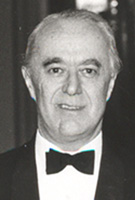James Johnston Mason Brown
James Johnston Mason Brown[edit | edit source]
James Johnston Mason Brown (1908–1964) was a prominent Scottish surgeon and a pioneer in the field of pediatric surgery. His contributions to the medical field, particularly in the care and surgical treatment of children, have left a lasting impact on the practice of surgery in the United Kingdom and beyond.
Early Life and Education[edit | edit source]
James Johnston Mason Brown was born in Edinburgh, Scotland, in 1908. He was educated at the University of Edinburgh, where he pursued his medical degree. During his time at university, Brown developed a keen interest in surgery, which would shape his future career.
Medical Career[edit | edit source]
After completing his medical degree, Brown began his surgical training at the Royal Infirmary of Edinburgh. He quickly distinguished himself as a talented and dedicated surgeon. His early work focused on general surgery, but he soon developed a special interest in pediatric surgery, a field that was still in its infancy at the time.
Contributions to Pediatric Surgery[edit | edit source]
Brown was instrumental in establishing pediatric surgery as a distinct specialty within the field of surgery. He recognized the unique needs of children and advocated for specialized surgical techniques and care tailored to young patients. His work in this area helped to improve surgical outcomes and reduce mortality rates among children undergoing surgery.
Academic and Professional Achievements[edit | edit source]
In addition to his clinical work, Brown was a respected academic and educator. He held a professorship at the University of Edinburgh, where he taught and mentored many future surgeons. His lectures and writings on pediatric surgery were influential in shaping the curriculum for surgical training programs.
Brown was also actively involved in several professional organizations. He was a founding member of the British Association of Pediatric Surgeons and served as its president. His leadership and vision helped to advance the field of pediatric surgery and promote collaboration among surgeons worldwide.
Legacy[edit | edit source]
James Johnston Mason Brown's legacy is evident in the continued growth and development of pediatric surgery as a specialty. His pioneering work laid the foundation for modern surgical techniques and practices that are now standard in the care of children. Brown's commitment to education and professional development has inspired generations of surgeons to pursue excellence in their field.
Related Pages[edit | edit source]
Search WikiMD
Ad.Tired of being Overweight? Try W8MD's NYC physician weight loss.
Semaglutide (Ozempic / Wegovy and Tirzepatide (Mounjaro / Zepbound) available. Call 718 946 5500.
Advertise on WikiMD
|
WikiMD's Wellness Encyclopedia |
| Let Food Be Thy Medicine Medicine Thy Food - Hippocrates |
Translate this page: - East Asian
中文,
日本,
한국어,
South Asian
हिन्दी,
தமிழ்,
తెలుగు,
Urdu,
ಕನ್ನಡ,
Southeast Asian
Indonesian,
Vietnamese,
Thai,
မြန်မာဘာသာ,
বাংলা
European
español,
Deutsch,
français,
Greek,
português do Brasil,
polski,
română,
русский,
Nederlands,
norsk,
svenska,
suomi,
Italian
Middle Eastern & African
عربى,
Turkish,
Persian,
Hebrew,
Afrikaans,
isiZulu,
Kiswahili,
Other
Bulgarian,
Hungarian,
Czech,
Swedish,
മലയാളം,
मराठी,
ਪੰਜਾਬੀ,
ગુજરાતી,
Portuguese,
Ukrainian
Medical Disclaimer: WikiMD is not a substitute for professional medical advice. The information on WikiMD is provided as an information resource only, may be incorrect, outdated or misleading, and is not to be used or relied on for any diagnostic or treatment purposes. Please consult your health care provider before making any healthcare decisions or for guidance about a specific medical condition. WikiMD expressly disclaims responsibility, and shall have no liability, for any damages, loss, injury, or liability whatsoever suffered as a result of your reliance on the information contained in this site. By visiting this site you agree to the foregoing terms and conditions, which may from time to time be changed or supplemented by WikiMD. If you do not agree to the foregoing terms and conditions, you should not enter or use this site. See full disclaimer.
Credits:Most images are courtesy of Wikimedia commons, and templates, categories Wikipedia, licensed under CC BY SA or similar.
Contributors: Prab R. Tumpati, MD

